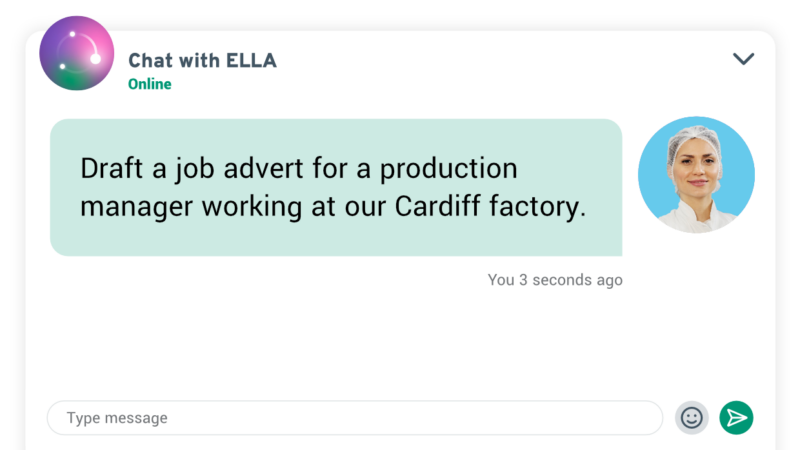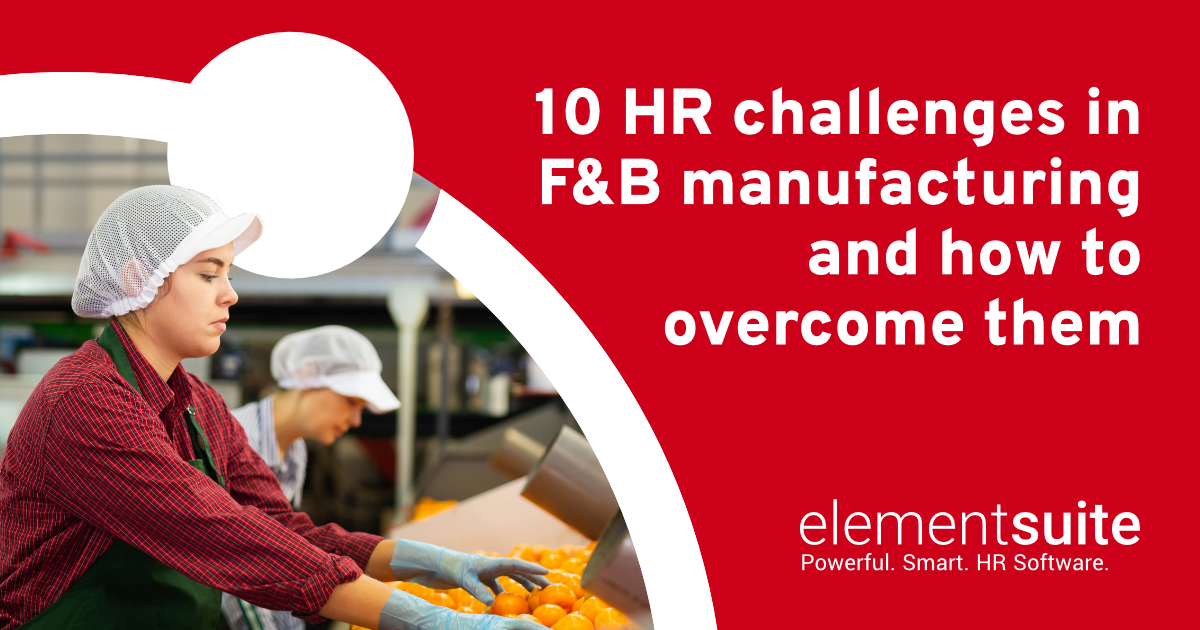The food and beverage, or F&B, manufacturing industry faces numerous HR challenges, which can impact productivity, employee satisfaction, and overall operational efficiency. Addressing these challenges is crucial for maintaining a competitive edge and ensuring sustainable growth.
Take a look at the 10 significant HR challenges in F&B manufacturing below, and the strategies to overcome them!
1. Recruitment and retaining the right talent
Talent shortage
The manufacturing industry faces talent shortage, which is particularly pronounced in the F&B sector. The UK is falling short of excellence in manufacturing due to a lack of skilled workers – in 2023 alone, persistent labour shortages cost the industry about £1 billion in lost output. This shortage is caused by several factors, including an ageing workforce, a lack of interest among younger generations, and the rapid advancement of technology outpacing current skill sets.
The effects of this talent shortage are far-reaching, leading to reduced productivity, increased operational costs, and hindered innovation. To address this, companies need to implement strategies such as:
- Apprenticeship programmes: Partnering with educational institutions to create apprenticeship schemes can help cultivate a pipeline of skilled workers.
- Upskilling initiatives: Providing ongoing training to current employees ensures they can adapt to new technologies and processes.
- Employer branding: Promoting the company as an attractive place to work can help attract young talent.
Recruitment process
The recruitment process in the F&B manufacturing industry must be agile and flexible to adapt to changing market demands. Traditional recruitment methods may not suffice in a highly competitive environment. Leveraging technology, such as AI tools like elementsuite’s ELLA, can streamline the hiring process, improve candidate matching, and reduce time-to-hire.

2. Training and development
Training and development are vital for personal and professional growth in the manufacturing industry. Comprehensive training ensures employees are up-to-date with industry advancements and safety protocols, ultimately leading to higher productivity and job satisfaction.
A good Learn platform, for instance, ensures compliance with training pathways and tracks completion. It provides extensive reporting tools that offer insights into training data, helping HR managers identify skill gaps and plan development programmes effectively.
3. Shift management
Shift management is a significant challenge in the F&B manufacturing industry due to the need for continuous operations. Ensuring continuity, fairness, and efficient scheduling is crucial to avoid burnout and maintain morale.
A good staff scheduling solution can help you:
- Generate accurate forecasts & targets
- Create optimised schedules
- Publish open shifts & authorise changes
- Allocate TRONC and calculate shift premiums
- Give you control over your finances
With precise labour forecasting, Lawsons’ staff allocation is now automatically mapped against Lawsons’ demand and budget with the implementation of elementsuite’s Workforce Management tool, and site- and employee- specific data is used to easily auto-generate rotas
Take a look at how Lawsons use forecasting and shape of day features
4. Compensation and benefits
Designing a competitive and equitable compensation package is essential to attract and retain top talent. HR managers face challenges such as meeting evolving employee expectations and promoting inclusivity in their benefits offerings.
To overcome these challenges, companies should:
- Benchmark compensation: Regularly compare salary packages against industry standards to remain competitive.
- Customised benefits: Offer flexible benefits that cater to diverse employee needs, such as health insurance, wellness programmes, and retirement plans.
- Transparent communication: Clearly communicate the value of the compensation package to employees, highlighting both monetary and non-monetary benefits.
5. Performance management
Performance management is crucial for boosting productivity, aligning individual performance with organisational objectives, and fostering a culture of continuous improvement. Effective performance management systems help managers identify performance gaps early and develop action plans for improvement.
By investing in comprehensive training and development programs, companies can significantly enhance their employees’ skills and abilities, leading to improved performance, innovation, and a bridge that closes the skills gap. In addition, growth opportunities act as a motivational factor for employees, driving their engagement and satisfaction by offering clear pathways for career advancement.
This is where personalised career roadmaps within your HR software can make a significant difference. It allows employees to map their development journey based on their interests, strengths and goals while aligning with the organisation’s objectives.
Learn more about why Travelodge chose elementsuite to help forecast staffing needs across 580 UK hotels
6. Injury, damage & theft prevention
Food and beverage manufacturing environments pose various risks, including injuries from slips and falls, damage to equipment, and sometimes employee theft. Developing a comprehensive policy for injury, damage, and theft prevention is essential to ensure workplace safety and reduce losses.
Key steps to develop such a policy include:
- Risk assessment: Conduct regular risk assessments to identify potential hazards.
- Safety training: Implement ongoing safety training programmes to educate employees on best practices.
- Security measures: Invest in surveillance and inventory management systems to prevent theft and damage.
7. Employee engagement
Engaging employees in the manufacturing sector can be challenging due to monotonous tasks and high work pressure. However, engaged employees are more productive, loyal, and contribute positively to the work environment.
Strategies to enhance employee engagement include:
- Recognition programmes: Implement recognition programmes to celebrate achievements and milestones.
- Open communication: Foster a culture of open communication where employees feel heard and valued.
- Career development: Provide clear career pathways and development opportunities to motivate employees.
8. Diversity & inclusion
Promoting diversity and inclusion within the workforce is vital for fostering innovation and reflecting the diverse customer base of the F&B industry. However, achieving this can be challenging due to existing biases and structural barriers.
To promote diversity and inclusion:
- Inclusive hiring practices: Ensure recruitment processes are free from bias and encourage applications from diverse candidates.
- Diversity training: Conduct regular training sessions to raise awareness about the importance of diversity and inclusion.
- Employee resource groups: Support the formation of employee resource groups to provide a platform for diverse voices.
9. Compliance with labour laws
Compliance with labour laws is a critical aspect of HR management in the manufacturing industry. Non-compliance can result in legal penalties and damage to the company’s reputation.
HR managers should:
- Stay informed: Keep up-to-date with changes in labour laws and regulations.
- Regular audits: Conduct regular compliance audits to ensure all practices meet legal standards.
- Employee education: Educate employees about their rights and responsibilities under current labour laws.
10. Technological integration
Integrating new technologies into manufacturing processes is essential for maintaining competitiveness but can pose HR challenges, including resistance to change and the need for new skill sets.
To facilitate technological integration:
- Change management: Implement robust change management strategies to ease the transition.
- Continuous learning: Encourage a culture of continuous learning where employees are motivated to update their skills.
- Stakeholder involvement: Involve employees in the technology selection process to gain their buy-in and address their concerns.
Conclusion
The HR challenges in F&B manufacturing are multifaceted and require strategic solutions to ensure a productive and engaged workforce. By addressing these challenges proactively, companies can enhance their operational efficiency and maintain a competitive edge in the industry.
elementsuite offers a comprehensive HR & WFM platform that is perfectly designed for the needs of the Food & Beverage manufacturing industry. With features to ease staff scheduling, empower employees, streamline HR processes and more, elementsuite is built to enhance operational efficiency across the organisation.




